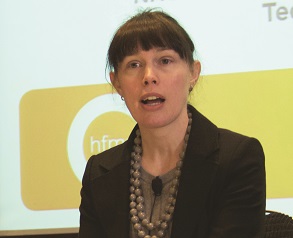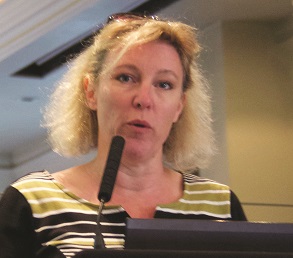Feature / Manchester rising
 Built on the site of the Peterloo Massacre to commemorate the repeal of the Corn Laws, the Manchester Free Trade Hall (pictured) has been linked to many political and cultural events. A legendary punk gig held there is said to have spawned many of the city’s best known bands and a heckler in its audience famously branded Bob Dylan ‘Judas’ when he went electric. Last month, plans for an overhaul of health and social care in the city were outlined at the venue – plans that, in time, could be viewed as equally significant.
Built on the site of the Peterloo Massacre to commemorate the repeal of the Corn Laws, the Manchester Free Trade Hall (pictured) has been linked to many political and cultural events. A legendary punk gig held there is said to have spawned many of the city’s best known bands and a heckler in its audience famously branded Bob Dylan ‘Judas’ when he went electric. Last month, plans for an overhaul of health and social care in the city were outlined at the venue – plans that, in time, could be viewed as equally significant.
The devolution of powers to Greater Manchester is well known. But with the project going live at the beginning of this month, the HFMA Provider Finance faculty conference gave a timely insight into how it will work and how it aims to improve the health and care of local people.
Katy Calvin-Thomas, Greater Manchester health and social care team director, said there were some obvious reasons for devolution, local decision-making being one. But her team wanted to make local health and care services clinically and financially sustainable. ‘I’m not saying we couldn’t do it without devolution, but it creates a real sense of control and being in charge,’ she said.
Health and social care could also contribute to the wider local economy by helping people back into work. The local economy contributes around £20bn to the Exchequer, but consumes £27bn, including £6bn in healthcare spending that has now been devolved to the area. ‘There is something about how we as a community get our economy back into balance,’ she added.
Statistics made the argument for devolution compelling. More than two-thirds of local premature deaths are the result of behaviours that could be changed. And a fifth of 55- to 64-year-olds are out of work mostly due to ill health. ‘If we could bring the employment rate up to the UK average, we would lift 16,000 children out of poverty,’ Ms Calvin-Thomas said. Across the city, £1bn a year is spent on long-term conditions related to mental illness and life expectancy for this group is 10% to 15% shorter than the rest of the population. By 2021, 35,000 people will have dementia and just under a third will have severe symptoms requiring 24-hour care.
Ms Calvin-Thomas acknowledged that it could take 10 or 15 years to change some of these outcomes, but they could not continue providing services as they do now. She said: ‘If you look at our outcomes for the last 10 to 15 years, they have not moved. They are still as bad as they were and we have got to do better.’
But in addressing some of these issues, local health and social care bodies would have to take a more holistic view that cut across organisational and sector boundaries.
She acknowledged this would be difficult. For example, a focus on improving the social and emotional development of children in the run-up to school age – currently four out of 10 five-year-olds are not ready to start school – would not produce direct savings for health and social care, but would have a knock-on effect on educational attainment and benefit the local economy.
‘Health and social care devolution can contribute to the wider devolution work that will lead to the creation of a community that is growing economically, vibrant and thriving and able to look after itself,’ she said. ‘The health and social care work is an important place to start.’
On the other hand, health and social care would benefit from more people being in work, as those with jobs tend to stay healthier than those without work. ‘We can’t sort it all out, but we can help people to be healthy and stay in work so that the other things flow from that.
Terms of engagement
In February 2015, the 37 local statutory health and social care organisations plus NHS England signed a memorandum of understanding underpinning the devolution of the £6bn health and care budget on 1 April this year. The 37 organisations have a governance framework, with a strategic partnership board on which each body has a representative.
Agreement between providers to work together has been one of the most significant steps forward. They have formed a provider federation, which Ms Calvin-Thomas said was ‘critical’. ‘They are talking to NHS Improvement about having a Greater Manchester licence with an additional condition on working with the federation, but they are not waiting for that [before moving on]. They don’t agree on everything,
but they have clear risk and gain share – part of their work is to look at that transparently.’
Sally Parkinson (right), Greater Manchester health and social care devolution associate chief financial officer, said the risk and gain share agreement was crucial. ‘It has always been the stumbling block – everybody needs to gain and everybody needs to take risk,’ she said.
The GM strategic partners developed a five-year plan underpinned by a financial framework to help give the plan credibility, Ms Calvin-Thomas said. ‘We started with a high-level assumptions-based plan. This was quickly embedded in our 10 localities so that, over time, rather than being assumptions-based, it will become a real plan.’
This would help address the forecast £2bn shortfall in funding by 2021. ‘Creating a financially balanced and sustainable system underpins everything else we are doing,’ she added.
Ms Parkinson said additional NHS funding and protected social care money would contribute £700m to closing the funding shortfall.
The team of three finance staff who put the framework together had identified opportunities for savings. Locally driven work, supported by integration, payment reform and GM-wide digital transformation, could deliver almost £400m by preventing ill health. ‘These were the easy things to talk about because everyone understands they are the right thing to do,’ Ms Parkinson said.
A further £158m could be made in provider savings through better care – reducing lengths of stay, for example. The biggest single element identified was in provider cost improvements, aided by workforce transformation. This came to savings of £736m, although Ms
Parkinson said this would change as the model was run before the announcement of the sustainability and transformation fund and associated control totals.
Provider reconfiguration could provide a further £139m and collaboration between providers on estates and the provision of back office services could deliver a further £120m, but there would be additional capital costs of £200m. The GM team was working with local government colleagues to minimise this cost and talking to the Department about keeping the receipts from the sale of surplus estate.
Localities were asked to show how they would realise these potential savings in their local plans. These were put together using commissioner and local authority plans, together with providers’ five-year plans for Monitor/NHS Trust Development Authority, to give a picture across Greater Manchester.
‘It’s no surprise that in year one the level of transformation is limited and the impact on activity, outcomes and finance is not going to be massive,’ Ms Parkinson said.
But Ms Calvin-Thomas added that the locality plans were crucial when it came to discussions on funding with the Department of Health, Treasury and NHS England.
She said that they also looked for quick wins – often initiatives that had been planned or were even in progress, such as seven-day GP access or creating a single public health system for Greater Manchester.
The team believed they needed £500m to front-load transformation. Greater Manchester was able to secure a total of £450m of transformation funding. Ms Calvin-Thomas said they want to use this funding to reimagine services across the whole care system. It was focusing on five areas for transformational change:
Population health investing in services that will make the biggest difference to the population’s health and wellbeing
Community-based care a new care model delivered closer to home and driven by local integration and multispecialty community provider work. Groups of GPs are rethinking primary care delivery.
Standardising acute and specialist care reducing variation by creating best practice specifications, enabled by standardised information management and technology.
Standardising support services providing clinical support and back office services at scale. Ms Calvin-Thomas asked why each trust, council and NHS England office needed their own IT department, for example.
Enabling better care including creating new payment models, ways of commissioning and contracting to incentivise working the city.
Using the funding
Ms Parkinson said the transformation fund was a ‘spend it or lose it’ fund and would stand at £60m in year one. She did not anticipate many localities would need transformation funding in the first year.
‘What’s critical is that it is non-recurrent – it’s to fund things like double-running costs while we put the new system in place and it will not be used to prop up deficits; it’s to get you to a place where you don’t make a deficit. We have requested a return of 3:1 on the transformation funds, but that’s for the whole locality, not just the providers.’
The team has set up five pan-city provider efficiency programmes, each with its own director of finance lead:
- Procurement
- Pharmacy
- Pathology and radiology
- Back office
- Estates.
Greater Manchester has already made some procurement gains in the past few years, Ms Parkinson said. But she added: ‘Every organisation still has its own procurement team. There has got to be some benefit from looking at a cross organisation approach.’
A high-level model had shown opportunities in addressable spend to deliver savings of £100m over a five-year period. Standardisation is key. ‘There is a wide variety of product choice even within organisations, she said. ‘That can’t be right and we should challenge that. Doing it as a GM partnership we will be able to do more.’
Many of the potential gains in pharmacy are in procurement and ideally there would be a central pharmacy store for the city. The pharmacy workstream will build on the model hospital work in the Carter review, she added. A change in mind-sets is needed for the pathology and radiology programme to succeed. ‘Who’s going to give up their pathology department?’ Ms Parkinson asked. ‘We need to do it more effectively than we do at the moment and use technology better. People are probably aware of what can be done, but we need to get to the point where trusts are comfortable with pathology not being on site.’
Back-office focus
While shared services are not a new idea, there is potential to achieve greater efficiencies in the back office, she said. This could be up to 25% of costs, made, perhaps across CCGs, providers and local authorities. Transactional elements of finance and HR could be put into a centralised shared service for Greater Manchester.
A high-level assessment of estate utilisation showed huge variations, Ms Parkinson continued, and the aim of this workstream is to use public sector property as a single resource across the city.
‘We anticipate activity growth of about 9% over the period, so if we do nothing we would need 9% more beds. However, in the solution to the £2bn problem we are doing two things that will bring that down – we aim to reduce acute activity, which will bring the number of beds needed down by 15%, and use beds better through reducing lengths of stay. That will account for another 15% – an aggregate of 30%. So we think we can have a 20% reduction in beds. It’s a massive ask and some hospitals have private finance initiative estate where they are tied in for 20 years. There are a lot of issues that mean we just can’t take out 20%.’
There is much to do in a short space of time – the Greater Manchester team will face pressure to deliver results in five years even though some of their programmes could take 10 or 15 years to bear fruit. But if they succeed, their work could go down as revolutionary.
Tameside action
The conference heard how one area plans to tackle a financial shortfall, clinically unsustainable services and a complex public health challenge under the umbrella of GM devolution.
Jessica Williams (right), programme director for integration at Tameside and Glossop health and social care, said the area – on the east side of the city – had some of the worst healthy life expectations in the country. In some wards, the average healthy life expectancy was 57 years.
Its local hospital, Tameside Hospital NHS Foundation Trust, was one of the Keogh trusts, but it came out of special measures last September having improved practically every aspect of its performance. But the health and care system around it was poor and as a consequence it rarely hit the 95% A&E target, she said.
Finances were difficult. The contingency planning team from Monitor – sent in to address issues at the trust – identified a potential £70m shortfall in the local health and care economy by 2020.
The situation had to be addressed quickly. ‘We need to push integration using GM devolution where we can, but we cannot allow GM devolution to slow us down,’ Ms Williams said.
‘Our vision of integration is about bringing down silos, stopping unnecessary duplication, achieving standardisation and economies of scale. People should only go to hospital when they need to.’
The work is complicated by the fact that Glossop is in the Derbyshire County Council area, but she said they aimed to ensure continuity of services whether in Glossop or Tameside.
The Tameside and Glossop local plan is known as the ‘Care together’ programme and it has two pillars – the creation of a single commissioning function for health and social care and an integrated care organisation (ICO) to deliver health and care services as efficiently and effectively as possible.
The first pillar was scheduled to go live on 1 April with a budget of £420m.
‘We are going to have one finance director for commissioning and one for providers. These people are going to hold the ring. From 1 April, contracts will be more or less block, with a floor and ceiling, but we are moving to capitation outcomes-based contracts,’ Ms Williams added.
The ICO – the first in the country – will be created by April 2017. This will sub-contract some services to other providers. Tameside and Glossop has bid for GM transformation funding to support its plans.
Related content
The Institute’s annual costing conference provides the NHS with the latest developments and guidance in NHS costing.
The value masterclass shares examples of organisations and systems that have pursued a value-driven approach and the results they have achieved.